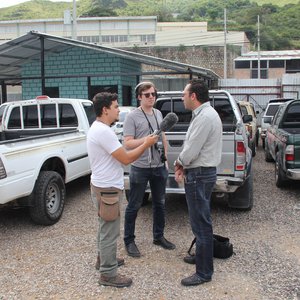
German Andino and Marlon Bishop reporting from Honduras
A gritty view from the streets of Tegucigalpa, where extortion has become a thriving industry for gangs, while also bankrupting legitimate business, driving down employment and even ending the lives of those who refuse to pay. Reporters German Andino and Marlon Bishop analyze the economics of extortion and looks at the effect it has on the lives of small-business people just trying to pay their bills.

Dec. 19, 2014
Continue reading original article
Dec. 19, 2014
From poverty to gangs, this episode of Latino USA takes a deep dive into the root causes of why people leave Honduras to travel through Mexico and to the U.S.
This episode was the recipient of a 2014 Peabody Award and was produced in collaboration with Round Earth Media
Continue reading original articleDec. 18, 2014
If you are a bus driver in Honduras, there's this thing that happens all the time. You'll be behind the wheel of your bus at an intersection, and a kid will come, knock on your window, and hand you a cellphone.
The voice on the phone will say something like this: "Hi, I'm calling from such-and-such a gang. If you want to keep driving this route, you have to pay me money, every week. Or else we will kill you."
And it's not like you pay this one gang, and they protect you from other gangs. The bus owner who …
Continue reading original articleJan. 26, 2015
Sagrario nos espera en la oscuridad del salon de su casa, en un barrio del mercado de Tegucigalpa, capital de Honduras. Reza por nuestras vidas y pide a dios que nuestra reunion sea fructifera mientras esconde debajo de un cojin sus piernas entumecidas por la poliomielitis. Su hermana, que estara presente durante toda la entrevista, es la encargada de la seguridad del encuentro: ha venido a recogernos a la entrada del barrio para llevarnos hasta la casa de la familia, cierra las ventanas, pone el candado a los portones detras de nosotros, manda jugar lejos a los ninos que corren …
Continue reading original article
German Andino found what he calls “a quick connection” to reporting partner Marlon Bishop. “Working with Marlon...was really interesting because he and I had different approaches to the stories. He was interested...in sounds, capturing the audio, the environment. I was interested in drawing. We focused on different things during the same interview. Our first interview went really well. Afterwards we would chat about how we would tell the story. There were lots of exchanges of ideas.” (One of Andino's drawings is shown above). As the project progressed, Bishop and Andino dug deeper into the issues. Andino noticed that by pairing a foreign journalist with a local journalist “you find people felt more comfortable talking while a local was present. Also I had a contact on the street, who was able to help us get connected with people.” However, the Honduran admitted, “Sometimes it is unsafe for the local reporter to be seen working closely with a foreigner in town.<br>You know the chances of you getting robbed and such are higher because you are close to a foreigner.” Fortunately, Andino knows the streets of Tegucigalpa well and was able to check out reporting locations before Bishops's arrival. Once there, the pair kept in close contact with editors by cell phone, a safety precaution that has become standard procedure for Round Earth Media teams."